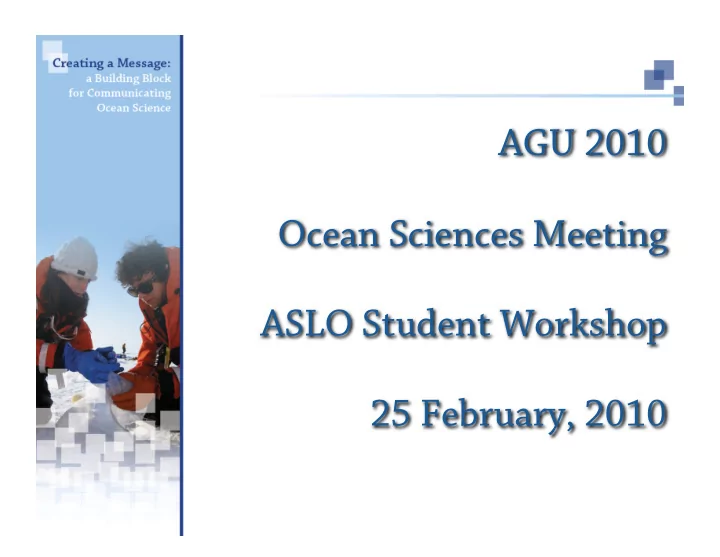

AGU 2010 Ocean Sciences Meeting ASLO Student Workshop 25 February, 2010
Presenters Janet Warburton Arctic Research Consortium of the U.S. Nora Deans North Pacific Research Board Francis Wiese North Pacific Research Board Jacquelyn Hams Los Angeles Valley College Mark McKay Venture Academy/Delta VISTA Maggie Prevenus Kalama Intermediate School With contributions from Elizabeth Eubanks
Workshop Goals & Agenda Workshop Goal To learn how to create your own message about your research that can be tailored to a variety of audiences. Workshop Agenda Introduction to messages All about message elements Create your own message Expert advice --- panel presentation and discussion Where to find more Discussion and Closing
Creating Your Message
Messages “We don’t need more information. We need to know what it means. We need a story that explains what it means and makes us feel like we fit in there somewhere.” Annette Simmons, The Story Factor
“Even if you have reams of evidence on your side, remember: numbers numb, jargon jars , and nobody ever marched on Washington because of a pie chart. If you want to connect with your audience, tell them a story.” Andy Goodman
“ In a two-hour speech, people will remember a two-minute story.”
Messages Tips What are the primary points you want to communicate?
Messages Tips How do they affect the public’s interest in health, safety and quality of life?
Messages Tips What everyday analogies will help communicate your message?
Audience Who is your audience? Tailor your message accordingly
Audience Marine researchers Marine resource management agencies Commercial and subsistence users Teachers and students in Alaska and beyond Alaska coastal communities General public --NPRB Science Plan, pg. 151-152
Research Summaries Series based on Science Plan research themes -- Magazine style
Synopses
Website
Traveling Exhibit
Pop-up Traveling Exhibit
Videos
Books
Media
Message Elements Who What Where When Why
Activity Now, it’s your turn! Create two phrases that communicate your research.
Bering Sea Haiku As the cold seas warm scientists plunge in to find where the fishes go.
Tips Stop speaking in code Don’t overdue “weasel words” Avoid confusing words – “positive trends” Use your words, not acronyms Give examples and metaphors – From “Improving How Scientists Communicate About Climate Change, Susan Joy Hassol, EOS, March 2008
Tips Overused Phrases Perfect Storm Holy Grail Paradigm Shift - The National Association of Science Writers
Advice from the Panel Scientists Educators Middle school High school Informal
Science Stories from the Field
YOU- THE RESEARCHER Bridge the Gap - Make a Broader Impact CONNECT with - school districts -science teachers TEACHER/ CLUB LEADER -school science clubs -scout groups -create a project - collect data - collaborate on a Wikispace Volunteer -host a class on your topic -participate in Career Day Students/Kids - Elizabeth Eubanks St. Mark Catholic School,Boynton Beach, Families FL hoocaca@yahoo.com
Activity 2 Write a short message that describes your research Wad up your message and throw it to someone else in the room Pick up message and read aloud
Resources
NSF Ocean Sciences Helping scientists achieve broader impacts and share research with the public Promoting partnerships between ocean scientists and educators
American Geophysical Union Communicating Your Science to the Public www.agu.org
AAAS Communicating Science Tools and Workshops www.aaas.org
COSEE California Communicating Ocean Science Course Communicating Ocean Science for Informal Audiences Course www.coseeca.net
NSF Workshops Communicating on Climate Change: An Essential Resource for Journalists, Scientists, and Educators Metcalf Institute for Marine and Environmental literacy
Ocean Observing The GoodmanCenter.com -- Ocean Observing Storytelling & Datavisualization Workshop
A Guide for Scientists Developed by the Centers for Ocean Science Education Excellence and TOS TOS website
Scientifically Speaking
Discussion and Questions
Thank You!
Recommend
More recommend